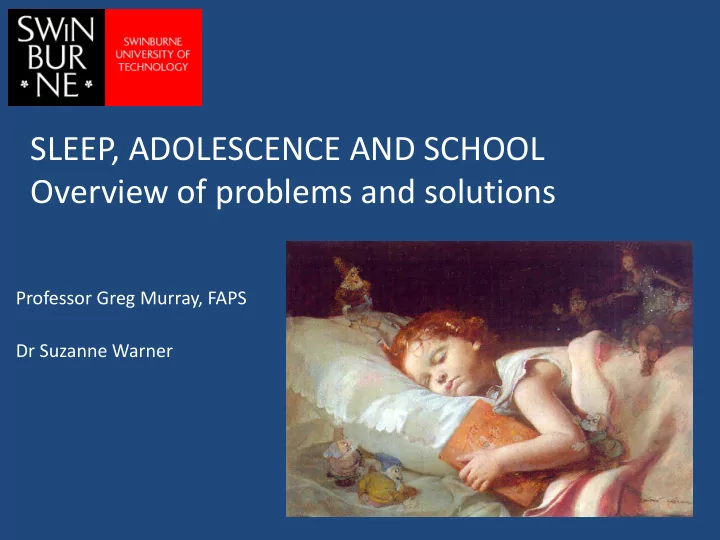

SLEEP, ADOLESCENCE AND SCHOOL Overview of problems and solutions Professor Greg Murray, FAPS Dr Suzanne Warner
Today’s talk • Why do we sleep? • What’s wrong with adolescent sleep? • How can adolescents improve their sleep?
Three types of alertness Relaxed brain Relaxed body Inward orientation NREM Activated brain Activated brain Paralysed body Activated body REM WAKE Inward orientation External orientation
Physical function of sleep • Brain does its house-keeping during sleep – Washes away toxins generated by mental work in the daytime – Brain cells shrink during sleep to open up the gaps between neurons and allow fluid to wash the brain clean (Science, 2013) • Sleep is as important for general health as diet and exercise – Little community awareness – School-based education programs emerging
Psychological functions of sleep
Cognition • Consequences of sleep loss – Decreases executive function, attention, concentration – After 19 hours without sleep, performance on some tests poorer than 0.05% BAC – 2 hours per night over a week: irresistible urge to fall asleep • Demonstrated benefits of sleep – Insight formation – Novel language perception – Visual discrimination – Motor skills – i.e. the building blocks of learning
Emotion regulation • Sleep loss – Increases negative emotions to goal-thwarting events – Decreases positive emotions to rewarding events • Emotional arousal disturbs sleep and emotion regulation – Vicious cycle between sleep disturbance and emotion dysregulation • Sleep disturbance strongly associated with depression – Disturbed sleep primary symptom of depression – Disturbed sleep predisposes to depression
What is the problem with adolescent sleep?
Three factors determine when we sleep • Time since sleep – Drive for sleep increases with wakefulness – Adenosine is a by-product of energy expenditure, inhibits wakefulness • Arousal – Late night study, social stimulation, anxiety disturb sleep • The body clock – Biological clock in the brain regulates timing of transition into sleep and wake
• Biological need for sleep decreases only marginally in adolescence – Sleep need = 9 hrs. 15 mins – 8 to 10 hours required (National Sleep Foundation, 2015) • Marked change in preferred time of sleep – Body clock becomes delayed with puberty – Nocturnal rise in melatonin occurs later – Sleep/wake phase becomes markedly delayed
Social factors and adolescent sleep • Decreased parental control of sleep time • Increased social interests and obligations • Earlier scheduling of classes and extra-curricular activities • Weekend oversleeps generate ‘social jetlag’
Impact of school on adolescent sleep Holiday School Term Weekday 09:12 07:55 Weekend 08:55 08:51 Weekday Bedtime 23:58 22:45 Weekend Bedtime 00:40 00:24 Weekday Waketime 09:36 07:04 Weekend Waketime 09.56 09:22
Consequences of adolescent sleep habits • Epidemic of sleep deprivation in adolescents (American Academy of Pediatrics, 2014) • School nights: 77 mins less than prescribed amount, and 77 mins less than vacation sleep • Insufficient sleep: – Lower mood, mood swings, attention deficits, poor daytime functioning and lower grades (Wolfson & Carskadon, 1998; Warner et al, 2007; Baum et al, 2013) – Accidents – Physical health problems (particularly cardiovascular) – Weight gain and obesity
Improving adolescent sleep • Sleep phase delay is fundamentally biological, but problem can be magnified or minimised by behavioural choices • Sleep on any given night is not critical for health, but good sleep habits are
• Value sleep as you value diet and exercise • Aim for 8½ – 9 ¼ hours sleep per night • Choose a bed time that works for you, go to bed around this time each day, including weekends – Weekend sleep-ins are OK, but don’t awaken more than 1 -2 hours later than your usual wake time • Develop a soothing pre-sleep routine to train the body into a relaxed state for bed – Hot bath, quiet read, chamomile tea, relaxation strategies (e.g., Smiling Mind) in the hour before bed
• Create a good sleeping space that is dark, comfortable, cool, quiet and uncontactable • Avoid bright light in the evening – Screens, especially computer screens at close range tell the body clock that it is not yet dark • Avoid stimulation in the evening – Social network as a source of stimulation • If you have any worries or concerns at bedtime, write them down for consideration in the morning • If you’re not asleep 20 minutes after lights out, get up and do something quiet until you feel tired
Better wake = better sleep • Get outside during the day, preferably early in the morning • Get some exercise each day (finish your exercise at least 3 hours before bedtime) • Avoid napping • Avoid caffeine after noon
Conclusions • Sleep is fundamental to physical and emotional wellbeing • Sleep deprivation partly explains common problems of secondary students • Simple strategies can improve sleep to ensure adolescents get the sleep they need
Recommend
More recommend